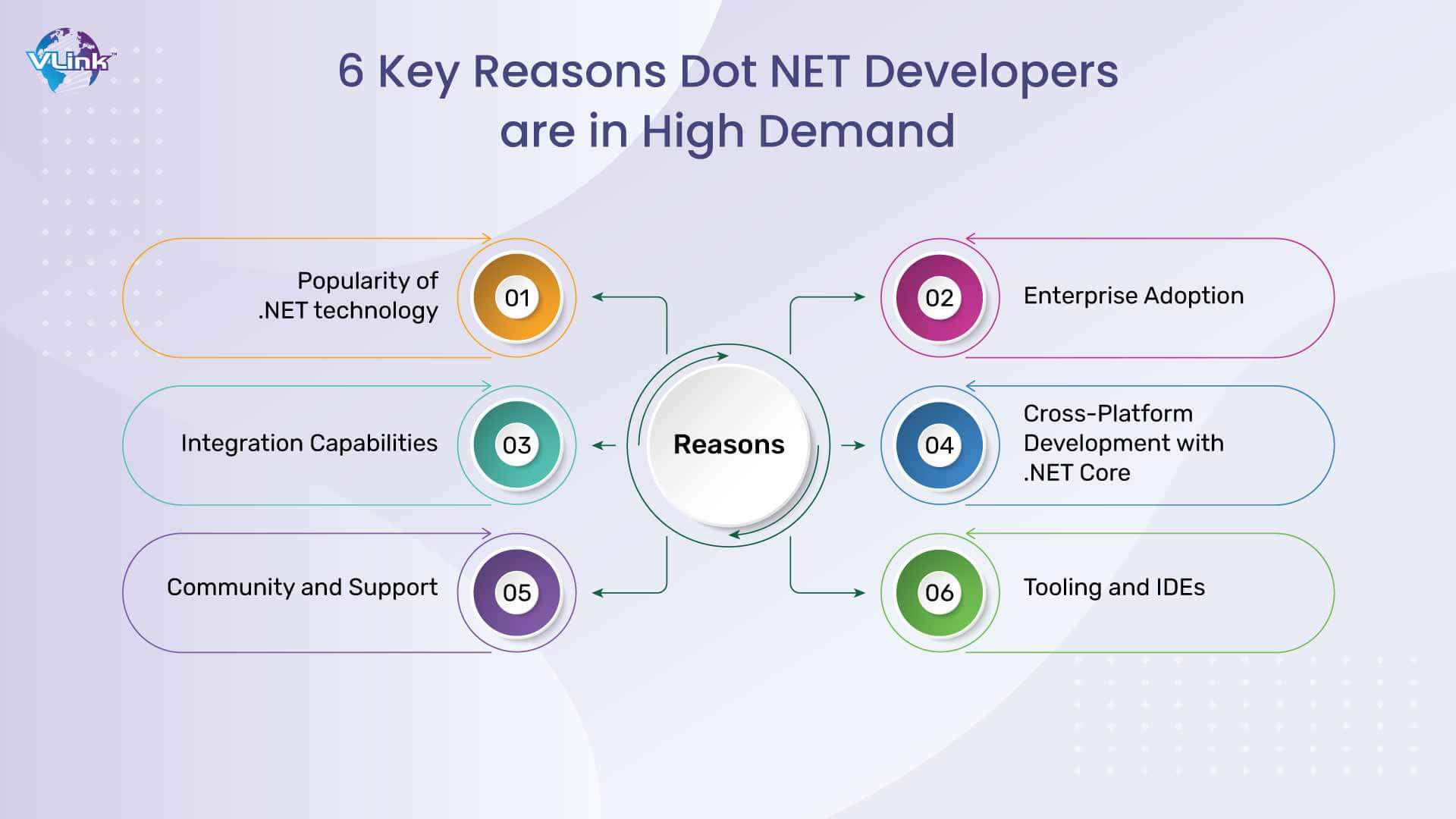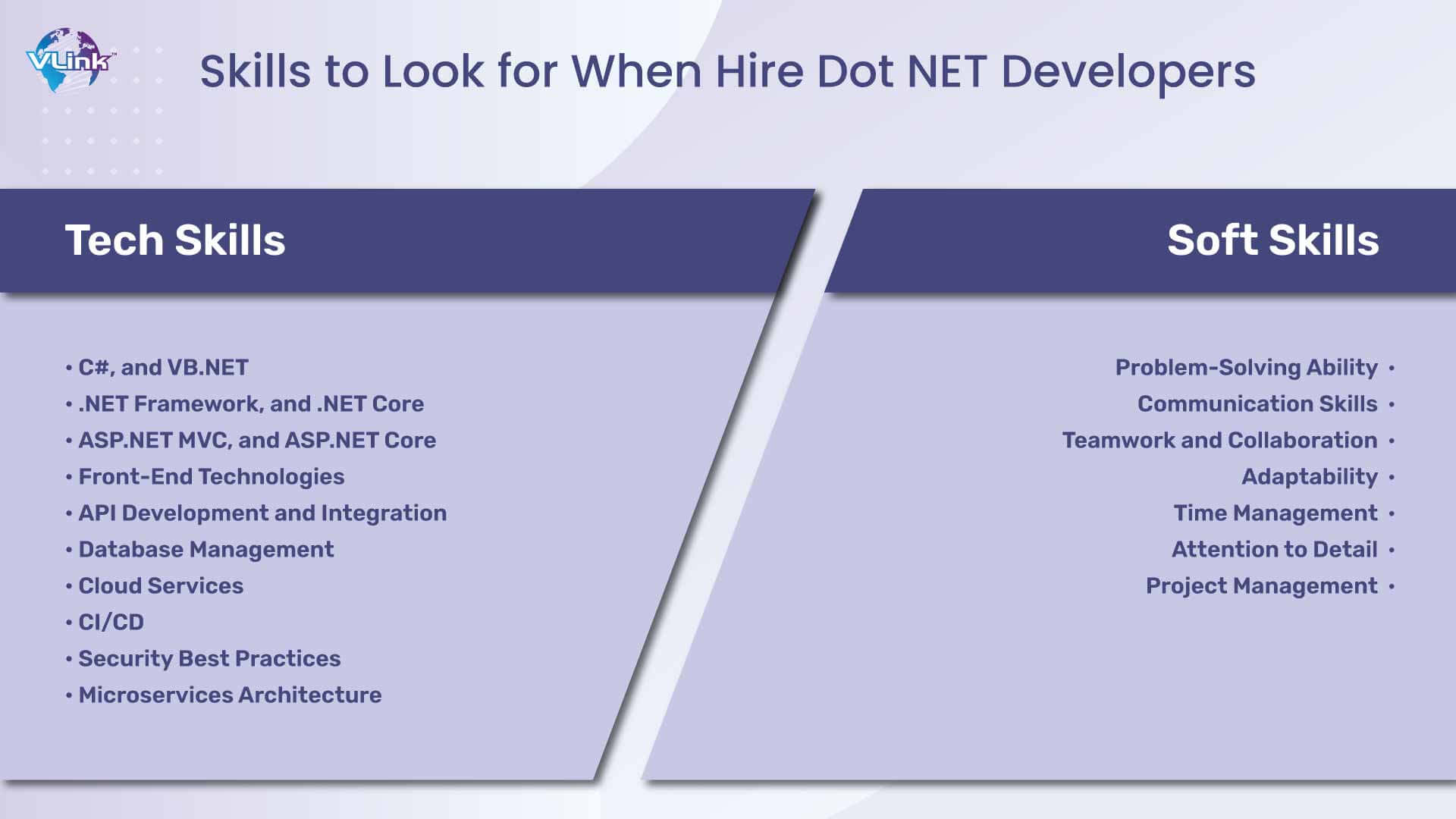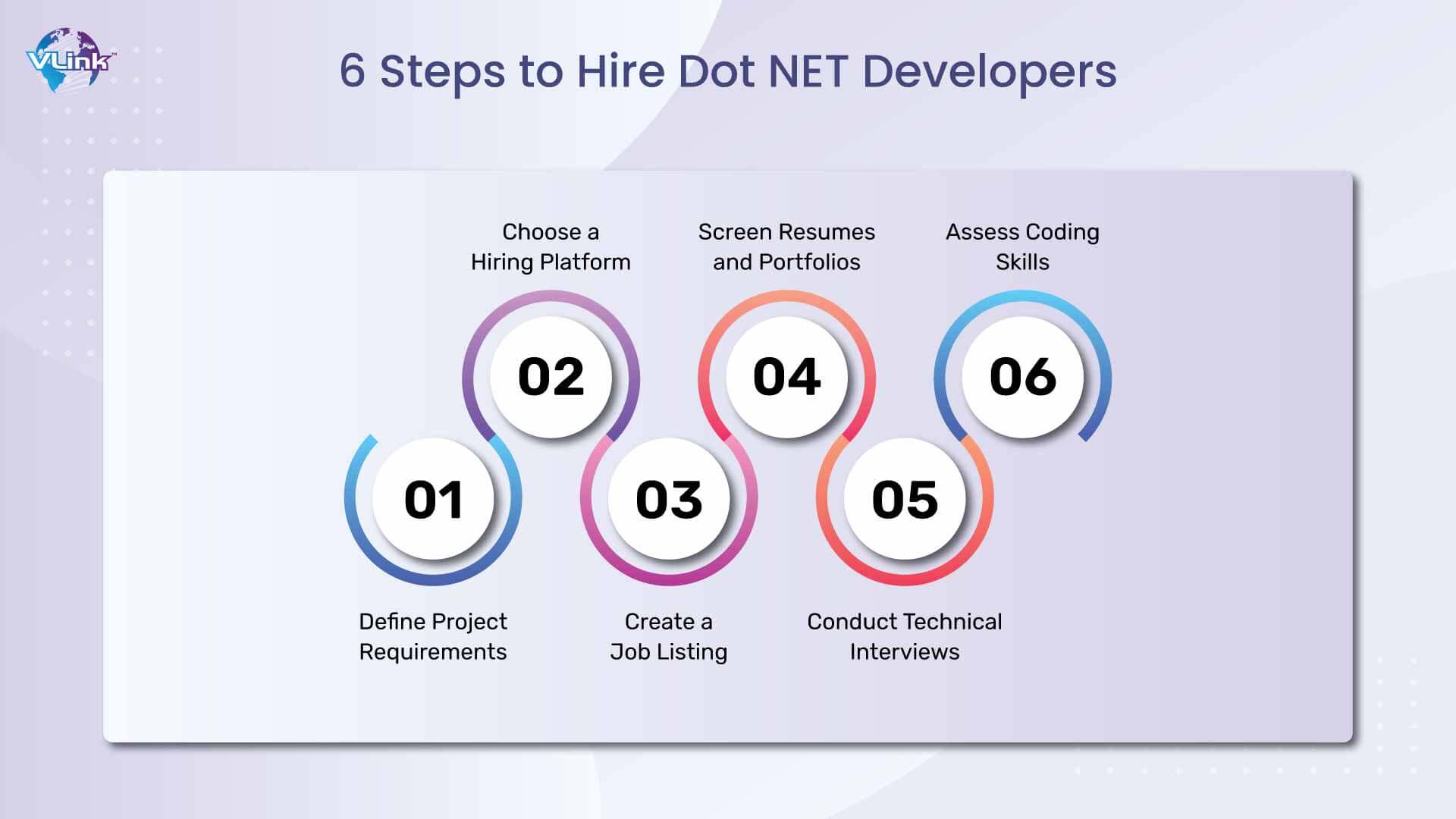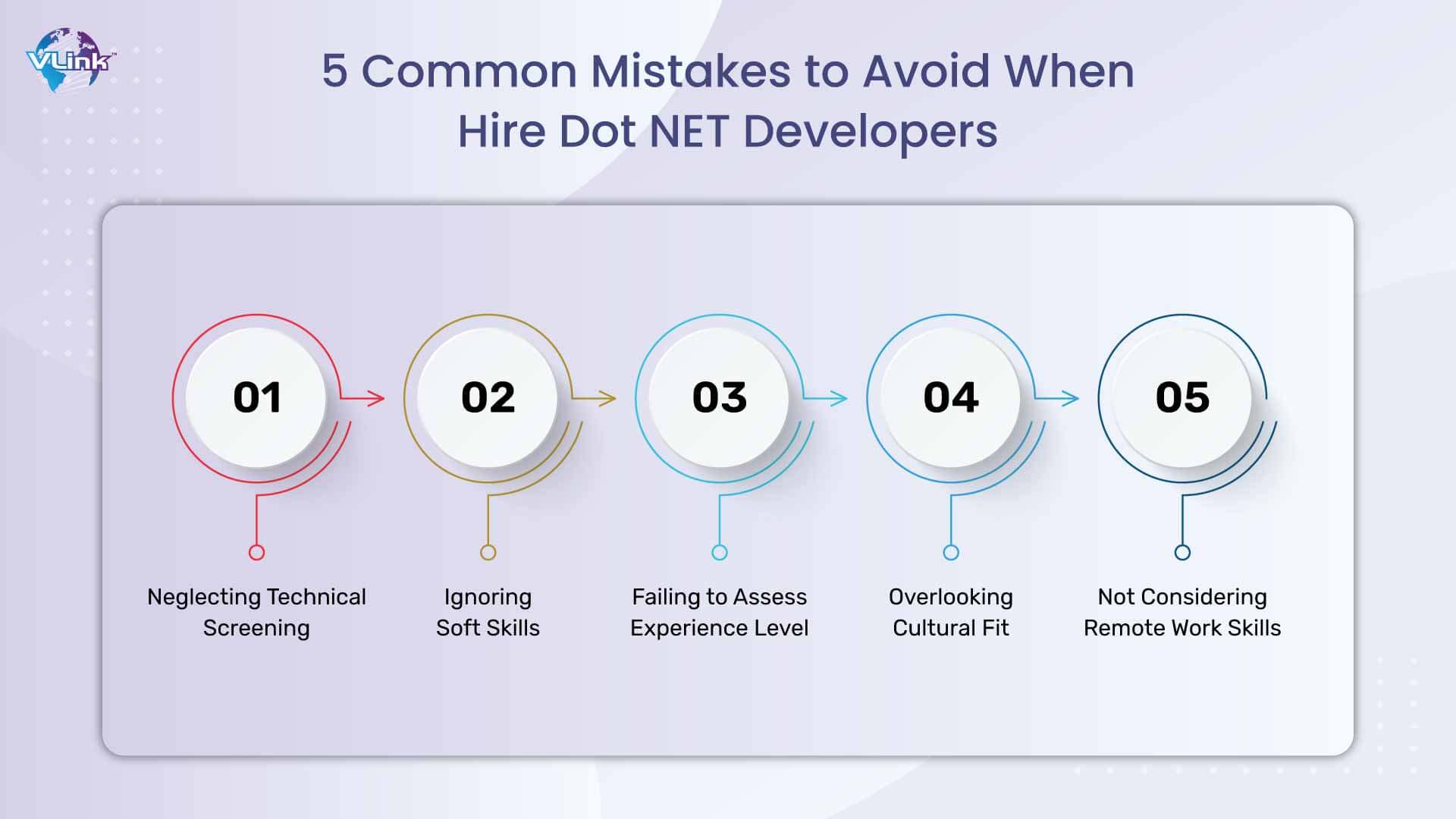Undoubtedly, hiring a .NET developer is the best choice if you want to build robust, scalable, and high-performance applications efficiently. However, accessing skilled ones is becoming challenging every year. A significant factor is the global tech talent shortage and high competition for experienced developers.
Another significant challenge companies or organizations face when hiring .NET developers is balancing the need for speed, stability, flexibility, and quality in their development processes.
As the demand for ASP .NET developers and Dot NET programmers is increasing continuously, finding the right fit for your projects as per your timeline or requirements has become difficult.
So, there is one trustworthy and reliable partner for you - VLink.
We guarantee stability, flexibility, speed, and quality when it comes to delivering .NET developers for your projects. Our rigorous vetting process and extensive talent pool ensure that you get the best developers who are not only proficient in .NET and ASP .NET but also reliable and committed to your project's success.
In this step-by-step guide, we'll walk you through the process of hiring .NET developers, along with interview questions, mistakes, and costs to hire Dot NET programmers.
Let’s start with reasons why .NET developers are gaining so much popularity:
Why is Hiring Dot NET Developers in Such High Demand?

.NET programmers have been in high demand for a long time and will continue to be so by businesses and organizations in the future. The projected net developer job growth rate is 13% from 2018-2028.
Here are other key reasons why hiring .NET developers are in high demand:
Popularity of .NET technology
The .NET framework is widely used for building a diverse array of applications, spanning web, desktop, mobile, cloud, gaming, and IoT. Many businesses have adopted Dot NET as their preferred tech stack, creating a demand for skilled developers in this ecosystem.
Enterprise Adoption
Many large enterprises have legacy systems built on Dot NET and continue to use and expand these systems. As these enterprises grow and evolve, they require skilled .NET developers to maintain, upgrade, and develop new features for their existing systems.
Integration Capabilities
.NET offers robust integration capabilities with various other technologies, databases, and systems. That’s why hiring .NET developers is valuable for businesses looking to create interconnected and efficient IT ecosystems.
Cross-Platform Development with .NET Core
.NET Core, now succeeded by .NET 5 and later versions, is cross-platform, allowing developers to build applications that run on Windows, Linux, and macOS. This cross-platform app development frameworks capability broadens the potential application of .NET skills. So, organizations prefer to hire .NET developers for a wider range of projects.
Community and Support
The .NET developer community is large and active, providing extensive resources, support, and collaboration opportunities. This vibrant community helps Dot NET developers stay updated with the latest advancements and best practices, enhancing their value to employers.
Tooling and IDEs
Microsoft provides best software development tools and integrated development environments (IDEs) like Visual Studio, which are widely regarded for their productivity-enhancing features. Dot NET Developers skilled in these tools are in high demand as they can deliver high-quality software efficiently.
Overall, the combination of technological robustness, wide adoption in enterprise environments, and integration capabilities makes dedicated .NET developers highly sought after in the software development market.
Skills to Look for When Hire Dot NET Developers

When hiring Dot NET Developers in the United States, it’s essential to look for talent with precise skills and expertise to ensure they can successfully contribute to your projects.
Here are 11 crucial technical skills to consider:
- Expertise in programming languages like C#, F#, and VB.NET used in Dot NET Development.
- Strong understanding of the .NET ecosystem, its frameworks, and.NET Core for building modern, scalable applications
- Knowledge of ASP.NET MVC, ASP.NET Core 6.0, and Web API for developing web applications and services
- Understanding of front-end technologies such as HTML, CSS, JavaScript, and popular frameworks like Angular, React, or Vue.js.
- Experience with SQL Server, including writing complex queries, stored procedures, and database design
- Familiarity with ORM tools like Entity Framework.
- Knowledge of cloud services, deployment, and DevOps practices and cloud platforms like Microsoft Azure or AWS
- Experience setting up and building CI/CD pipelines using tools like Azure DevOps, Jenkins, or GitHub Actions
- Proficiency in building and consuming RESTful APIs
- Knowledge of common security practices and protocols, including authentication and authorization mechanisms
- Understanding of microservices principles and experience with related technologies like Docker and Kubernetes
You need to look beyond technical skills also to hire the right talent for a .NET development project.
Here are a few soft skills to look for when hiring a dedicated Dot NET developer:
- Must have strong analytical and problem-solving skills to diagnose issues and devise effective solutions
- Excellent verbal and written communication skills for collaborating with team members and stakeholders
- Ability to work well in a team environment and collaborate with other developers, designers, and product managers.
- Adaptability to new tools, technologies, and methodologies
- Effective time management skills to handle multiple tasks and meet deadlines
- Keen attention to detail to ensure high-quality code and thorough testing
- Ability to prioritize tasks, manage workloads, and work efficiently on various projects
Must-have skills for Dot NET developers based on their experience level
Here's a table that outlines the must-have skills for .NET developers based on their level of experience:
Experience Levels | Must-Have Skills |
Beginner-level (0-2 years) |
|
Mid-level (2-5 years) |
|
Senior-level (5+ years) |
|
When Should You Hire a Dot NET Developer?
Here are several scenarios when you need to hire Dot NET developers at a fixed cost:
If you have specific, ongoing needs for developing, maintaining, or upgrading .NET applications;
This project requires custom enterprise solutions, web applications, or APIs built with the .NET framework. Dot NET developers will help you achieve this within the specified time period.
If you want to integrate .NET applications with cloud services like Azure, optimize application performance, or ensure robust security practices;
A dedicated .NET developer can provide consistent, high-quality work.
If you have long-term projects;
Dot NET developers have in-depth knowledge of your systems, which is essential for successful web development and maintenance.
Things You Need to Consider Before Hiring Dot NET Developers

Here are five things you need to consider before hiring .NET developers:
Skills and Experience
Look for developers with strong proficiency in .NET framework, C#, ASP.NET, MVC, Entity Framework, and other relevant technologies. Check their experience with various .NET projects and their ability to solve complex problems.
Portfolio and References
Review their portfolio to assess the quality of their previous work. Reach out to their references to gather insights about their professionalism, reliability, and work ethic.
Knowledge of Latest Technologies
Ensure that the developers are up-to-date with the latest trends and technologies in the .NET ecosystem. They should be familiar with cloud platforms like Azure, DevOps practices, microservices architecture, etc.
Communication Skills
Effective communication is crucial for successful collaboration. Ensure that the developers have good communication skills to understand your requirements clearly and provide regular updates on the project's progress.
Coding Standards and Best Practices
Check if the developers follow coding standards and best practices in their work. Clean, maintainable code is essential for the long-term maintainability and scalability of your project.
6 Steps to Hire Dot NET Developers

Here are the six most important steps you need to follow when hiring top .NET developers for your project:
Step #1- Define Project Requirements
Before you start searching for .NET developers, it's crucial to have a clear understanding of your project requirements. Determine the specific skills, experience level, and expertise needed for the job.
Are you building a web application, a desktop application, or a mobile app? Do you require expertise in ASP.NET, .NET Core, or Xamarin? Clearly outline these requirements to ensure you attract candidates who are the right fit for your project.
Here is an example of the job description for Dot NET programmers:
Responsibilities:
- Design, develop, and maintain software solutions using the .NET framework and related technologies.
- Collaborate with cross-functional teams to gather requirements, analyze needs, and implement solutions.
- Write clean, efficient, and reusable code following best practices and coding standards.
- Troubleshoot and debug software applications to resolve issues and optimize performance.
- Stay updated on emerging technologies and trends in .NET development to improve skills and practices continuously.
- Participate in code reviews and contribute to team discussions for continuous improvement.
Requirements:
- Bachelor's degree in computer science, Engineering, or related field.
- Proficiency in .NET framework, C#, and object-oriented programming concepts.
- Experience with ASP.NET, MVC, Web API, and other relevant technologies.
- Familiarity with databases such as SQL Server, Oracle, or MySQL.
- Strong problem-solving skills and attention to detail.
- Excellent communication and teamwork abilities.
- Ability to work independently and manage multiple tasks effectively.
- Relevant certifications (optional but beneficial).
Step #2 - Choose a Hiring Platform
Once you have defined your project requirements, it's time to choose a hiring platform to advertise your job listing. There are several options available, including online job boards, professional networking sites, and specialized IT recruitment platforms. Consider the reach, cost, and effectiveness of each platform before making your decision.
#3 - Create a Job Listing
Craft a compelling job listing that clearly communicates the responsibilities, requirements, and benefits of the position. Highlight what makes your company an attractive employer and why talented developers should join your team. Be sure to include keywords and phrases relevant to .NET development to attract the right candidates.
#4 - Screen Resumes and Portfolios
Once you start receiving applications, carefully review each resume and portfolio to shortlist candidates who meet your criteria. Look for relevant experience, skills, and qualifications that align with your project requirements. Pay attention to candidates who have worked on similar projects or have experience with the specific technologies you are using.
#5 - Conduct Technical Interviews
Schedule technical interviews with the shortlisted candidates to assess their technical skills, problem-solving abilities, and fit for your team. Prepare a list of technical questions and scenarios to evaluate their proficiency in .NET development. Consider conducting both phone screenings and face-to-face interviews to get a comprehensive understanding of each candidate's capabilities.
#6 - Assess Coding Skills
Finally, the coding skills of the candidates will be assessed through practical coding exercises or take-home assignments. It will help you evaluate their ability to write clean, efficient code and solve real-world problems using .NET technologies. Provide clear instructions and guidelines for the coding assessment and allow candidates sufficient time to complete the task.
By following these six steps, you can effectively hire .NET developers remotely for your projects. Remember to adapt your approach based on the specific needs and requirements of your company and project.
With a well-defined hiring process and a clear understanding of what you're looking for, you can attract top talent and build a strong development team to drive your success.
Where to Find & Hire Dot NET Developers
Here are a few popular options from where you can find and hire developers for .Net development projects:
#1 - Job Boards like Stack Overflow and GitHub
Job Boards are popular among developers seeking new opportunities. Posting job listings on these sites can attract skilled .NET developers who actively engage with programming communities. Additionally, you can directly search for candidates based on their expertise and experience.
#2 - Outsourcing Companies like VLink
Outsourcing companies specialize in providing skilled developers for various projects, including .NET development. They often have a pool of talent with diverse skill sets and experience levels. Working with an outsourcing company like VLink can provide access to a team of .NET developers who are vetted and ready to contribute to your project.
#3 - Developer Communities like LinkedIn and Indeed
Platforms like LinkedIn and Indeed are not only for job postings but also for networking and connecting with professionals in the tech industry. Joining relevant groups and communities related to .NET development can help you find and engage with potential candidates.
You can also leverage LinkedIn's advanced search features to identify .NET developers based on their skills, location, and experience.
#4 - IT Staffing Agencies like VLink
IT staffing agencies specialize in recruiting and placing professionals in technology-related roles, including .NET development. These agencies typically have an extensive network of candidates and can assist you in finding the right fit for your project.
By partnering with an IT staffing agency like VLink, you can streamline the hiring process and gain access to a curated pool of .NET developers.
#5 - Freelance Websites like Upwork
Freelance websites connect businesses with independent contractors who offer their services remotely. Platforms like UpWork ensure that only top-tier developers are accepted into their network.
Hiring a freelance .NET developer through such platforms can provide flexibility in terms of project duration and scalability.
Interview Questions to Ask When Hire Dot NET Developers
When hiring .NET developers, it's essential to ask questions that assess both their technical skills and their fit for your team and project.
Here are some interview questions customized for hiring .NET developers:
Technical Questions:
- What is .NET Framework/Core?
- Differentiate between .NET Framework and .NET Core open source.
- Explain the MVC (Model-View-Controller) pattern and how it's implemented in ASP.NET.
- What is the difference between ASP.NET Web Forms and ASP.NET MVC?
- How does Entity Framework differ from ADO.NET?
- What is LINQ (Language Integrated Query), and how is it used in .NET development?
- Explain the concept of Dependency Injection and its importance in .NET development.
- How do you handle exceptions in .NET applications?
- What are the advantages of using asynchronous programming in .NET?
- Explain the concept of Web API and how it's used in .NET development.
- What is the role of Global Assembly Cache (GAC) in .NET?
- How do you secure ASP.NET applications against common security threats?
- Describe the process of deploying a .NET application to Azure.
- How do you optimize performance in .NET applications?
- Explain the concept of .NET Standard and its significance.
Problem-Solving and Coding Questions:
- Given a scenario, how would you design a database schema using the Entity Framework Code-First approach?
- Write a C# code to implement a simple CRUD (Create, Read, Update, Delete) operation using ASP.NET MVC.
- How would you handle authentication and authorization in an ASP.NET Core application?
- Write a LINQ query to retrieve data from a database with specific conditions.
- Given a performance issue in a .NET application, how would you diagnose and resolve it?
- Explain how you would implement caching in a .NET application to improve performance.
- Write a C# code to implement a multithreaded application.
- How would you handle cross-site scripting (XSS) attacks in an ASP.NET application?
- Explain the concept of model binding in ASP.NET MVC and how it works.
- Given a scenario, how would you design the architecture of a scalable and high-performance web application using .NET technologies?
Soft Skills and Team Fit Questions:
- Describe a challenging project you worked on and how you overcame obstacles.
- How do you prioritize tasks and manage deadlines in a fast-paced development environment?
- Describe a situation where you had to collaborate with team members with different skill sets.
- How do you stay updated with the latest trends and technologies in the .NET ecosystem?
- Tell us about a time when you had to explain a complex technical concept to a non-technical stakeholder.
- How do you handle constructive criticism or feedback from colleagues?
- What motivates you as a .NET developer, and what type of projects do you enjoy working on?
These questions can help you assess the candidate's technical knowledge, problem-solving abilities, and soft skills, providing a comprehensive evaluation of their suitability for the position.
Common Mistakes You Should Avoid When Hire Dot NET Developers

Hiring .NET developers requires attention to detail to ensure you're getting the right fit for your project. Here are five common mistakes to avoid:
- Neglecting Technical Screening: Don't solely rely on resumes or general interviews. Technical screening, such as coding tests or reviewing past projects, is crucial to gauge a candidate's actual skills and experience with .NET technologies.
- Ignoring Soft Skills: While technical prowess is important, soft skills like communication, problem-solving, and teamwork are equally vital. Neglecting these could lead to difficulties in collaboration and project management.
- Failing to Assess Experience Level: Make sure you're hiring developers with the appropriate level of experience for your project. Junior developers may need more depth of knowledge for complex tasks, while senior developers might be overqualified for simpler projects.
- Overlooking Cultural Fit: Compatibility with your company's culture can significantly impact productivity and team dynamics. Look for candidates who align with your organization's values, work ethic, and communication style.
- Not Considering Remote Work Skills: With the rise of remote work, assessing a candidate's ability to work effectively in a remote environment is crucial. Look for indicators like experience with remote collaboration tools and effective communication skills in virtual settings.
By avoiding these common mistakes, you can increase your chances of hiring skilled .NET developers who are the right fit for your team and project.
How Much Does it Cost to Hire Dot NET Developers?
The hourly rates for .NET developers may vary significantly, ranging from $30 to $150 or more. The exact cost to hire Dot NET programmers depends on different factors, including:
- Developer’s location
- Level of Expertise
- Years of experience
- Hiring model you choose
In addition, the cost of hiring a Dot NET developer always depends on different aspects — are you looking for an in-house engineer, want to hire a remote .NET developer, or need a freelancer for your Dot NET development project?
Are you considering developers from the US only, or are you open to offshore? The developer’s location, experience, and skills all influence salary requirements.
Here's a more detailed table reflecting the cost of hiring .NET developers based on various aspects such as employment type, location, and experience level:
The average .NET developer's salary depends on their experience level. Here’s what you can expect to pay:
Experience Level | Average Salary |
Junior .NET developer | $64,070 to $79,500 |
Mid-Level .NET developer | $80,500 to $83,121 |
Senior .NET developer | $84,428 to $111,948 |
Here's a table outlining the cost of hiring Dot NET developers based on employement type:
Employment Type | Average Cost Range (Per Hour) |
In-House (United States) | $70 - $150 |
Remote (United States) | $60 - $120 |
Remote (Offshore, e.g., Eastern Europe) | $30 - $70 |
Here's a table outlining the cost of hiring Dot NET developers based on location:
Location | Average Cost Range (Per Hour) |
United States | $60 - $150 |
United Kingdom | £35 - £90 |
Western Europe | €40 - €100 |
Eastern Europe | €25 - €60 |
Canada | C$40 - C$100 |
Asia (eg., India) | $20 - $40 |
Wrapping Up!
By following this step-by-step guide, you can streamline the hiring process and find the perfect .NET developer to bring your project to life.
It's not enough to outline your needs and screen resumes. You must ensure that the developer you hire can genuinely deliver on their claims. Talent assessments, like the Clean Code test, provide the most accurate measure of a candidate's skills.
If you want to avoid the complexities of the hiring process, feel free to contact us.
VLink is a leading IT staffing agency that can help you find a qualified, guaranteed Dot NET and ASP .NET expert easily. You tell us what type of candidate you need, and within 48 hours, you’ll have a skilled full-time remote .Net developer ready to start working with you.














